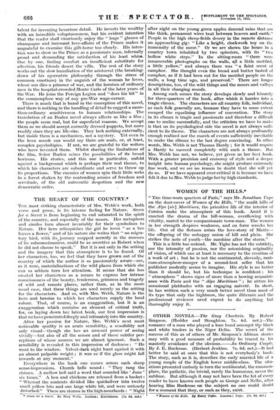WAR-TIME IN MONTE CARLO.t IF the enemies of women were
no more formidable than those in Seflor Ibafiez's latest novel, the ancient despotism of the weaker sex would not be seriously threatened, and there is probably that ironic reservation in the use of the title. Prince Lubimoff, son of a Russian princess and a Spanish gentleman- adventurer, is cut off from the source of his immense fortune by the War and the Bolshevist revolution. Obliged to practise comparative economy he retires to his villa at Monte Carlo, and there extends his hospitality to a few friends on the condition that women are 'excluded as strictly as if it were a monastery. Doubtless anticipating the disappointment of many readers the novelist proceeds to describe the Prince's previous life as a multi-millionaire, and gives the rein to his • The Wedgwood Medallion. By E. 1i. C. Jones. London : Chatto and Windus. [12s. 6d. net.] t The Enemies of Women. By' Vicente Blasco lbaliez. London : T. Fisher Unwin. [7s. 6d.]
talent for inventing luxurious detail. He invests the wealthy with an incredible voluptuousness, but his evident intention that the reader shall vicariously enjoy the " huge " glasses of champagne and incessant love-affairs of the Prince makes it ungrateful to examine this gift-horse too closely. His inten- tion was to show us the Prince as a passionate man, infernally proud and demanding the satisfaction of his least whim. One by one, finding comfort an insufficient substitute for affection, his friends desert the villa. The rest of the story works out the slow humiliation of the aristocrat (the breaking- down of his egocentric philosophy through the stress of common emotions) in the anguish of the woman he loves, whose son dies a prisoner of war, and the heroismnf ordinary men in the hospital-crowded Monte Carlo of the later years of the War. He joins the Foreign Legion and "does his bit" in the commonplace way of any pre-War wage-earner.
There is much that is banal in the conception of this novel, and there is nothing in the handling of detail to suggest a more- than-ordinary sensitiveness to human relationships. The translation of an Ibanez novel always affects us like a film ; the people seem real, but for superficial reasons. We accept them as we should accept correctly dressed puppets, but more readily since they are life-size. They lack nothing externally, but inside them is a mechanism, not a mystery. Yet even in the beau monde one would say there are souls, or, at least, complex psychologies. If not, we are grateful to the writers who have invented them. Whilst sharing the limitations of the film, Sefior lbafiez seizes the possibilities of its broad horizons. His stories, and this one in particular, unfold against a background which is perhaps their real theme, to which his characters are subordinate and serve to throw up its proportions. The enemies of women spin their little webs in a forest shaken by the contending armies of freedom and servitude, of the old autocratic despotism and the new democratic order.



























































 Previous page
Previous page